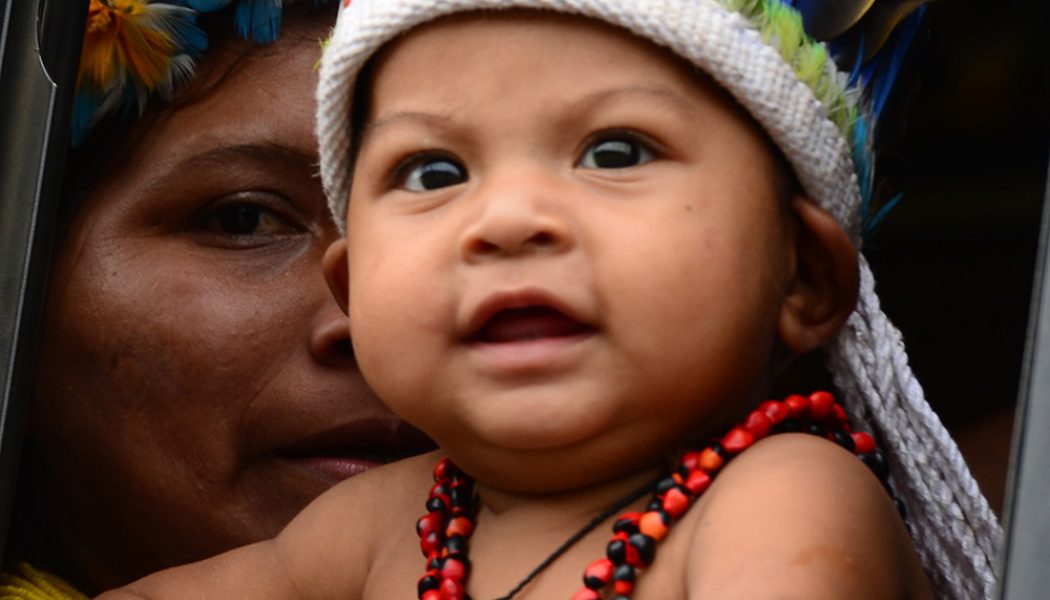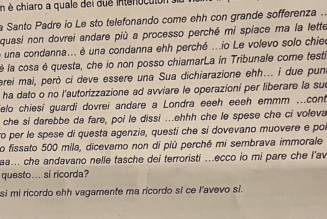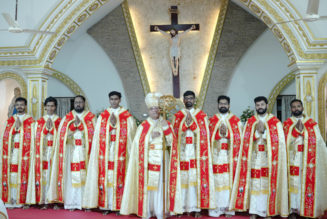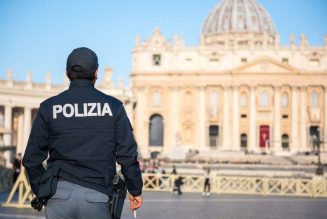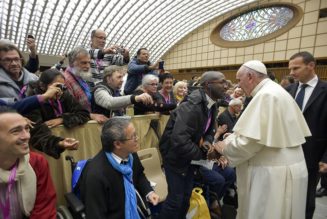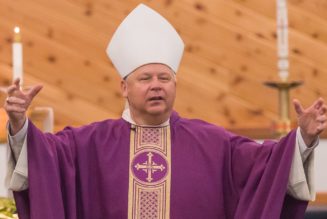ABOVE: Pope Francis, with Master of Ceremonies Msgr. Guido Marini at his side, offers Mass Feb. 1, 2020, at St. Peter’s Basilica in the Vatican [Andreas Solaro/AFP via Getty Images]. BELOW: See photo captions and credits at end of article.
In ‘Querida Amazonia,’ Pope Francis Lays Out a Vision for the Future of the Amazon
The post-synodal apostolic exhortation Querida Amazonia sets forth the Holy Father’s ‘Four Dreams’ for the region, but steers clear of endorsing married priests or women deacons.
VATICAN CITY — Through “four great dreams” for a better ecological, social, cultural and ecclesial future, Pope Francis says he wishes his new post-synodal apostolic exhortation will “awaken” the world’s “affection and concern” for the Amazon region — and help other areas of the world to confront their own challenges.
Entitled Querida Amazonia (The Beloved Amazon), his 16,000-word summary document is divided into four chapters, each dedicated to a “great dream.”
Drawing heavily on Francis’ magisterium and documents of bishops’ conferences in the region, it follows last year’s Synod of Bishops on the theme of “The Amazon: New Paths for the Church and for an Integral Ecology.”
The Amazonian region, the papal exhortation states, is a “great biome” shared by nine countries: Brazil, Bolivia, Colombia, Ecuador, Guyana, Peru, Surinam, Venezuela and the territory of French Guiana.
The most eagerly awaited aspect of the document — the ordination of married permanent deacons to make up for a shortage of priests in the region — is not explicitly endorsed, despite the majority of synod fathers voting for such a proposal.
The Pope does not mention the words “married priests,” “priestly celibacy” or viri probati. He does say a “way must be found” to ensure priests can bring the Eucharist to remote areas, but places more emphasis on giving laity a greater role while underlining the importance of the priesthood.
Also, despite the synod fathers discussing at length the possibilities of a female diaconate, he does not mention the topic and rejects the push for holy orders for women, saying such a move would “clericalize women” and diminish their “indispensable contribution.”
He also makes no explicit mention of an Amazonian rite of the Mass, also a subject widely debated at the synod, but he does call for greater efforts to be made to respect native “rituals, gestures and symbols” and to “inculturate the liturgy among indigenous peoples.”
‘A Social Dream’
Francis begins his summary document by describing it as a “brief framework for reflection” and weighing it against the synod’s final document, which he says he does not intend to replace or duplicate. “I would like to officially present the final document,” he says, adding that that text sets forth the synod’s conclusions better than he can and urging “everyone to read it in full.”
The Pope’s first chapter, entitled “A Social Dream,” focuses on raising the quality of life for the people of the Amazon, with a special emphasis on helping the poor and combating “injustice and crime.” He criticizes the damage caused by “economic actors” importing “alien” models of resource exploitation into the territories, the migration of indigenous peoples to cities, and the rise of xenophobia, sexual exploitation and drug trafficking.
“We need to feel outrage, as Moses did, as Jesus did, as God does in the face of injustice,” the Pope writes, adding that the extent of injustice and exploitation perpetrated on the Amazon region in the last century “ought to provoke profound abhorrence.”
He notes that some missionaries “did not always take the side of the oppressed,” and he humbly asks for forgiveness, while stressing it is possible to “overcome the various colonizing mentalities” and urging education for the poor. The Pope also notes that just as members of the Church have been guilty of corruption, so have the Amazonian peoples, who then became the primary victims.
The Holy Father ends the chapter by calling for dialogue, firstly with the poor, respecting them as “having a leading role to play,” and raising a “prophetic voice” on their behalf.
‘A Cultural Dream’
 In Chapter Two, entitled “A Cultural Dream,” the Pope takes a positive approach to indigenous peoples and their cultures, saying they should not be viewed as “’uncivilized’ savages.” They are “simply heirs to different cultures and other forms of civilization that in earlier times were quite developed,” he writes.
In Chapter Two, entitled “A Cultural Dream,” the Pope takes a positive approach to indigenous peoples and their cultures, saying they should not be viewed as “’uncivilized’ savages.” They are “simply heirs to different cultures and other forms of civilization that in earlier times were quite developed,” he writes.
Again, he laments how indigenous peoples have been driven into the cities, severing them from their cultural roots, and says “unfair generalizations, simplistic arguments and conclusions drawn only on the basis of our own mindsets and experiences” should be avoided.
He observes how a “consumerist vision” has a “leveling effect on cultures,” says “postmodern colonization” must be combated, and urges the young to “take charge” of their roots. For the baptized, these roots include “the history of Israel and the Church,” which, he says, can “bring joy” and inspire “noble and courageous actions.”
The Pope urges dialogue with Amazonian cultures and says an authentic identity is not preserved by “an impoverished isolation.” Concern for indigenous cultural values should therefore be “shared by everyone,” for their “richness is also our own.”
By contrast, he observes how a “globalized economy shamelessly damages” the richness of life and that the “disintegration of families” is a result of “forced migration.” Quality of life cannot be imposed “from without,” he says, as it must be “understood within the world of symbols and customs proper to each group.”
‘Ecological Dream’
 Francis turns to the “Ecological Dream” in Chapter Three, noting that the Lord teaches us to care for each other and the environment and recalling Benedict XVI’s teaching on “human ecology” and the link with “respect for nature.” The insistence that “everything is connected,” taken from Francis’ environment encyclical Laudato Si (Care for Our Common Home), is “particularly true” of the Amazon region, he says.
Francis turns to the “Ecological Dream” in Chapter Three, noting that the Lord teaches us to care for each other and the environment and recalling Benedict XVI’s teaching on “human ecology” and the link with “respect for nature.” The insistence that “everything is connected,” taken from Francis’ environment encyclical Laudato Si (Care for Our Common Home), is “particularly true” of the Amazon region, he says.
He goes on to lambast abuse of the environment and demands an end to the “destruction of mother Earth,” saying “multinationals have cut” her veins and she is “bleeding.”
Francis stresses the importance of water, refers to the Amazon River as the region’s “spinal column,” and says the “equilibrium of our planet” depends on the “health of the Amazon.” The rainforests serve as a “great filter of carbon dioxide,” he says, which prevents global warming and contain “countless resources” that could be “essential for curing diseases.”
Again he criticizes “powerful industries” and “huge global economic interests” for exploitation and for threatening the Amazon biome, but he says the answer is not found in “’internationalizing’ the Amazon region” but rather a “greater sense of responsibility” on the part of nation states.
He urges learning from the “ancestral wisdom” of indigenous peoples to know how to protect the region and learn from the Amazonian people to “contemplate” the region, not only analyze it. “If we enter into communion with the forest, our voices will easily blend with its own and become a prayer,” the Pope writes, leading to an “interior conversion” that will “enable us to weep for the Amazon region and to join in its cry to the Lord.”
He ends the chapter by calling for “ecological education” to overcome a deeply rooted “consumerism and the culture of waste” in the region — something, he says, the Church can help with.
‘An Ecclesial Dream’
 This brings him on to the final and longest chapter, “An Ecclesial Dream,” in which the Pope focuses on the Church’s role in the region. He stresses that it’s vital to preach the Gospel and bring Christ to others if the Amazon’s problems are to be properly confronted. This must include the “great message of salvation” and to work for “the justice and dignity they deserve.” The indigenous “have a right to hear the Gospel” and to know that God loves every man and woman in Christ, “crucified for us and risen in our lives.”
This brings him on to the final and longest chapter, “An Ecclesial Dream,” in which the Pope focuses on the Church’s role in the region. He stresses that it’s vital to preach the Gospel and bring Christ to others if the Amazon’s problems are to be properly confronted. This must include the “great message of salvation” and to work for “the justice and dignity they deserve.” The indigenous “have a right to hear the Gospel” and to know that God loves every man and woman in Christ, “crucified for us and risen in our lives.”
Referring to the Great Commission, he says without this “great message, every ecclesial structure would just become another NGO and we would not follow the command given us by Christ: ‘Go into all the world and preach the Gospel to the whole creation.’”
He frequently stresses the importance of kerygma (proclaiming the Gospel), while also emphasizing the importance of the Church reshaping her identity “through listening and dialogue.” In this way, inculturation can take place “that rejects nothing of the goodness that already exists in Amazonian cultures, but brings it to fulfilment in the light of the Gospel.”
The Pope goes on to say that Christianity does “not have simply one cultural expression,” and what is needed is “courageous openness to the novelty of the Spirit.” And again, he extols indigenous culture, saying “great riches” have been inherited from them, including an openness to God’s action, gratitude, sacredness, solidarity, shared responsibility, the importance of worship and belief in an afterlife. Their ability to be content with little “should be valued and taken up in the process of evangelization,” he says.
Perhaps in an oblique reference to the Pachamama controversy during the synod and the apparent pagan worship in the Vatican Gardens Oct. 4, the Pope says, “Let us not be quick to describe as superstition or paganism certain religious practices that arise spontaneously from the life of peoples,” and adds: “It is possible to take up an indigenous symbol in some way, without necessarily considering it as idolatry.”
The Pope does not discuss an Amazonian rite of the Mass; instead he supports elements of indigenous culture — “song, dance, rituals, gestures and symbols” — being “taken up into the liturgy,” but notes that after 50 years, “we still have far to go along these lines.”
He expresses disapproval of a Church that “excludes and turns people away” and instead argues for a Church that must “offer understanding, comfort and acceptance” rather than imposing a “set of rules” that only leads to feeling “judged and abandoned.” But mercy, he says, “can become a mere sentimental catchword unless it finds concrete expression in her pastoral outreach.”
‘Viri Probati’
 He calls for a thorough revision of priestly formation to make it more pastoral, but nowhere does he mention married priests or viri probati (the ordination to the priesthood of married men “of proven virtue”). Pope Francis does point out that in “more remote places, a way must be found” to ensure priestly ministry. “They need the celebration of the Eucharist because it ‘makes the Church,’” he says, and an accompanying footnote (136) quotes Canon 517 that states due to a lack of priests, a bishop can entrust “participation in the exercise of the pastoral care of a parish” to a “deacon, to another person who is not a priest, or to a community of persons.”
He calls for a thorough revision of priestly formation to make it more pastoral, but nowhere does he mention married priests or viri probati (the ordination to the priesthood of married men “of proven virtue”). Pope Francis does point out that in “more remote places, a way must be found” to ensure priestly ministry. “They need the celebration of the Eucharist because it ‘makes the Church,’” he says, and an accompanying footnote (136) quotes Canon 517 that states due to a lack of priests, a bishop can entrust “participation in the exercise of the pastoral care of a parish” to a “deacon, to another person who is not a priest, or to a community of persons.”
He goes on to say the Eucharist “requires the development” of a “rich variety” of “gifts and charisms” and that priests are necessary, but he adds: “this does not mean that permanent deacons, religious women and laypersons cannot regularly assume important responsibilities for the growth of communities, and perform those functions ever more effectively with the aid of a suitable accompaniment.”
Consequently, he says it is “not simply a question of facilitating a greater presence of ordained ministers who can celebrate the Eucharist.” That would be a “very narrow aim,” he says, if “new life in communities” were also not awakened, and he advocates greater lay involvement.
The Role of Women
 He extols the role of women in the Church in the Amazon, but says it would be a “reductionism” to believe that only giving women holy orders would mean they had “greater status and participation in the Church.” It would “narrow our vision,” he says, leading the Church “to clericalize women, diminish the great value of what they have already accomplished, and subtly make their indispensable contribution less effective.”
He extols the role of women in the Church in the Amazon, but says it would be a “reductionism” to believe that only giving women holy orders would mean they had “greater status and participation in the Church.” It would “narrow our vision,” he says, leading the Church “to clericalize women, diminish the great value of what they have already accomplished, and subtly make their indispensable contribution less effective.”
By stressing that a priest takes on the person of Christ to be Spouse to his bride, the Church, the Pope further underlines the importance of priests being male, adding that women contribute to the Church “in a way that is properly theirs, by making present the tender strength of Mary, the Mother.” He adds that in a “synodal Church,” women have a central role to play in Amazonian communities and should have access to other positions that do not entail holy orders.
After a brief few words on the what ecumenism and interreligious dialogue can offer the region, the Pope concludes with a prayer to Mary, calling on her to “reign in the beating heart of Amazonia” and to “touch the hearts of the powerful” so that “no one else can claim lordship over the handiwork of God.”
“We trust in you, Mother of life,” the Pope concludes. “Do not abandon us in this dark hour. Amen.”
Edward Pentin is the Register’s Rome correspondent.
